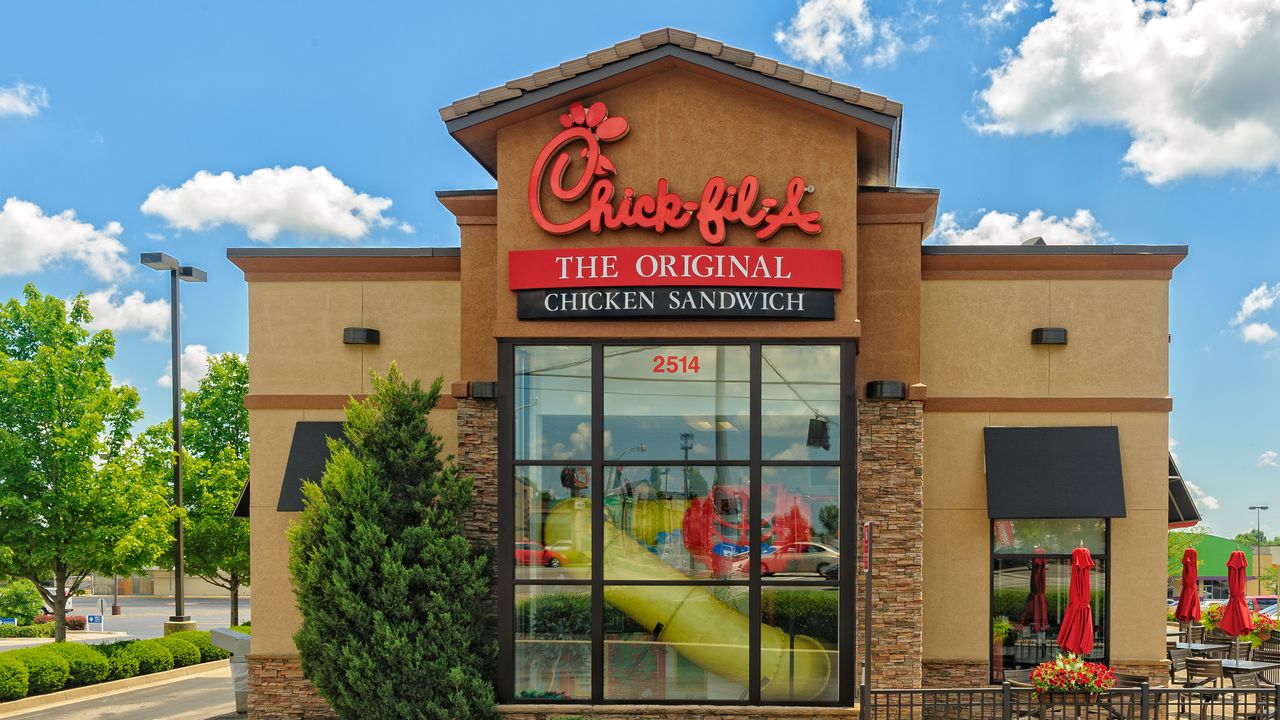With an acceptance rate lower than the Ivy League’s, owning a Chick-fil-A franchise might seem as challenging as getting into Harvard. Yet the potential to join this fast-food empire, which started back in 1946, ignites entrepreneurial spirits nationwide.
As of 2017, the brand’s over 2,000 restaurants collectively amassed a remarkable $9 billion in revenue, with a customer satisfaction standing that’s untouched in the industry—earning it the highest rank in QSR Magazine’s esteem.
The prospects of operating a franchise under a name synonymous with success draws thousands of ambitious minds, set on mastering the Chick-fil-A franchise success factors.
The company’s strict selection process, which admits less than 1% of applicants, does not deter the determined. This statistic not only underscores the exclusivity of the opportunity but also the unrivaled support and potential for profitability that comes with the brand.
Open a Chick-fil-A franchise, and you’re not just starting a business, you’re becoming part of a legacy—a legacy of quality, community, and customer-first ethos that has sculpted Chick-fil-A into the giant it is today.
Key Takeaways
- The potential for immense success with a Chick-fil-A franchise is mirrored by an acceptance rate less competitive than top universities.
- Being part of the Chick-fil-A family means joining a brand that leads the fast-food industry in customer satisfaction.
- A history of remarkable revenue growth signifies the strength of the Chick-fil-A brand as a fast-food empire.
- Operating a franchise requires understanding the key success factors unique to the Chick-fil-A business model.
- Chick-fil-A’s distinctiveness lies in its selection process, ensuring that franchise owners are deeply aligned with the company’s values.
- The prestige of owning a Chick-fil-A franchise is rooted in the brand’s commitment to community, quality, and unparalleled franchisor support.
Understanding the Chick-fil-A Franchise Opportunity
The Chick-fil-A franchise opportunity presents a unique blend of challenges and rewards for prospective business operators.
With the brand’s formidable reputation and its consistent track record of sales growth, many potential franchisees are drawn to the strength and stability that comes with the Chick-fil-A name.
The company prides itself on offering significant franchise support, ensuring those who enter the Chick-fil-A family are equipped to maintain the brand’s esteemed customer service and quality.
The Attraction of a Chick-fil-A Franchise
Becoming part of the Chick-fil-A franchise network is an attractive proposition due primarily to the brand’s loyal customer base and proven financial performance.
Additionally, individuals looking into the Chick-fil-A franchise application process find that the company’s support infrastructure, comprehensive training, and ongoing development courses are invaluable resources that offer a considerable advantage in the competitive fast-food sector.
Comparing Costs and Benefits
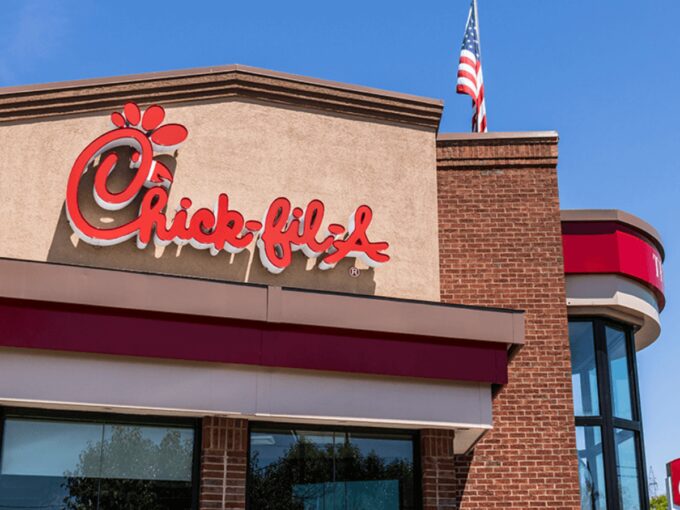
When evaluating the Chick-fil-A franchise cost, investors find that the initial franchise fee of $10,000 is strikingly modest compared to industry standards.
Chick-fil-A further endorses its operators by covering the majority of the initial startup costs—which include real estate, construction, and kitchen equipment, acknowledging this substantial investment as one of the significant benefits over other franchise opportunities.
Franchise Ownership Vs. Chick-fil-A Operator Model
Understanding the difference between traditional franchise ownership and the Chick-fil-A operator model is critical. Unlike conventional franchising, Chick-fil-A requires operators to be fully immersed in their business, expecting hands-on management rather than passive investment.
The company maintains control over site selection, and real estate, and retains ownership of the restaurants.
Therefore, Chick-fil-A franchise requirements are stringent and demanding, necessitating full-time commitment to the operational success of the restaurant. This business model is tailored to individuals who exhibit a strong commitment to Chick-fil-A values and are prepared for active daily involvement in their establishment.
| Franchise Aspect | Chick-fil-A Franchise | Traditional Franchise |
|---|---|---|
| Initial Investment | $10,000 (covered by Chick-fil-A) | Varies, typically higher |
| Control Over Site Selection | Managed by Chick-fil-A | Chosen by franchisee |
| Ownership of Property and Equipment | Owned and rented by Chick-fil-A | Owned by franchisee |
| Hands-On Involvement | Required and extensive | Varies |
| Multi-Unit Opportunities | Limited due to hands-on model | Available |
| Ongoing Support | Extensive training and development | Franchisee-dependent |
| Equity Accumulation | Not applicable | Franchisee gains equity |
How to Open a Chick-fil-A Franchise
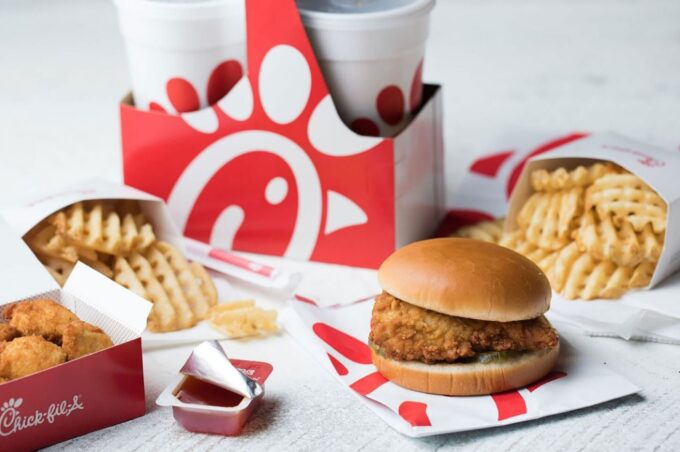
The journey to Chick-fil-A franchise ownership starts with fulfilling the company’s stringent prerequisites, which prioritize candidates who can offer full-time availability and demonstrate substantial leadership experience. The company seeks individuals who are not merely looking for an investment but are ready to dive deep into day-to-day operations.
One of the first steps in the Chick-fil-A franchise approval process is the online application, a gateway to the competitive landscape of prospective franchisees. Those who stand out in this initial phase present a clear vision of commitment to the brand’s values, customer service excellence, and community presence.
- Submission of the initial online application
- Proof of management or leadership experience
- Commitment to full-time, active involvement
Following the online submission, candidates enter an interview phase to further gauge their passion for service and alignment with Chick-fil-A’s culture.
Success in the interview phase leads to a detailed review of the franchise agreement, which outlines ongoing obligations and a mutual commitment to uphold the brand’s sterling reputation.
| Phase | Focus Area | Outcome |
|---|---|---|
| Application Review | Candidate’s Eligibility | Selection for Interviews |
| Interviews | Assessment of Commitment | Understanding of Brand Values |
| Franchise Agreement Review | Mutual Responsibilities | Reinforcement of Commitments |
Successful candidates are then invited to participate in a robust training program designed to sharpen skills essential for managing their future franchises effectively.
This stage is crucial for familiarizing franchisees with operational procedures, customer service protocols, and business management.
“We’re not in the chicken business; we’re in the people business.” – Truett Cathy, Founder of Chick-fil-A.
The operator is also made aware of the Chick-fil-A franchise fees which include not only the initial cost of entry but also monthly fees predicated on a percentage of the sales, ensuring the terms of partnership are clear and transparent from the outset.
By adhering to this meticulous procedure, Chick-fil-A ensures that its franchisees are well-equipped to take on the responsibilities that come with joining the fast-paced, customer-centric world of one of America’s most beloved fast-food chains.
The Comprehensive Application Process for Chick-fil-A Franchisees
Embarking on the journey to becoming a franchisee with Chick-fil-A requires aspirants to navigate a thorough process that evaluates their potential to uphold the brand’s esteemed reputation.
This multi-layered path to owning a Chick-fil-A franchise opportunity unfolds meticulously, ensuring that only the most qualified individuals are entrusted with the brand’s legacy.
Initial Application and Review
Prospective franchisees begin their quest for a Chick-fil-A franchise by submitting an initial application online. This first step is critical in gauging the candidate’s alignment with Chick-fil-A franchise qualifications.
Applications are then subject to a comprehensive review, where factors such as financial acumen, leadership experiences, and community involvement are thoroughly assessed.
Stringent Interviews and Assessments
Following the initial review, candidates enter a series of rigorous interviews and assessments.
These evaluations are designed to elucidate an applicant’s dedication to customer service excellence and their proficiency in navigating the operational challenges a franchise may present.
Chick-fil-A’s meticulous selection process aims to ensure that each franchisee embodies the brand’s values and commitment to quality.
Understanding Site Selection and Revenue Sharing

Acceptance into the Chick-fil-A franchise system introduces candidates to the intricacies of site selection and the brand’s unique revenue sharing model.
Unlike typical franchise operations, Chick-fil-A maintains ownership of all restaurant properties and assumes the responsibility for site selection, closely working with operators to identify lucrative locations based on strategic expansion plans.
Despite not owning the property, franchisees participate in a revenue sharing model that emphasizes a symbiotic relationship between franchisor and franchisee.
With a modest initial investment, franchisees agree to ongoing royalties based on gross sales, aligning interests and ensuring mutual commitment to the success of each Chick-fil-A franchise opportunity.
| Stage in Process | Key Aspects | Duration |
|---|---|---|
| Application Submission | Initial form submission evaluating eligibility | Initial Contact |
| Candidate Review | Assessment of financials, experience, and character | Up to several months |
| Interviews and Assessments | In-depth interviews gauging fit with company culture | Variable |
| Final Review and Acceptance | Final vetting before acceptance into the franchise program | Conclusion of the 12-24 month process |
The culmination of this extensive process exemplifies Chick-fil-A’s dedication to fostering a network of franchisees that are not merely investors but are true stewards of the brand’s core values and spirit.
Training and Support Provided by Chick-fil-A
Chick-fil-A franchise ownership is more than an investment; it’s an opportunity to join a network that values rigorous training and robust support systems.
This ethos is the backbone of the exceptional Chick-fil-A franchise support program that encompasses multiple dimensions of franchise operations.
Understanding that thorough preparation breeds successful operators, Chick-fil-A’s dedication to comprehensive training has set a gold standard in the fast-food industry.
The intensive six-week training program is designed to cover all facets of running a Chick-fil-A franchise.
From culinary skills to customer service excellence and proficient business management, franchisees are equipped with the knowledge and tools vital for thriving in a competitive marketplace.
Each new operator is mentored by an experienced franchisee, merging theoretical learning with practical, real-world insights.
Below outlines the structure and critical components of the Chick-fil-A training program:
- Core operation skills—understanding the daily in-and-outs of restaurant management.
- Financial acumen—grasping the essentials of accounting and profit management.
- Staff management—recruitment and training techniques for building an effective team.
- Quality control—maintaining Chick-fil-A’s standards of cleanliness and food safety.
- Customer relations—strategies for ensuring consistent customer satisfaction and loyalty.
After this extensive training, franchisees emerge fully prepared to take on the challenges of Chick-fil-A franchise ownership. This preparation underscores Chick-fil-A’s unwavering commitment to nurturing the growth and expertise of each franchisee, fostering a network of operators poised for success.
| Week | Focus Area | Description | Mentor Interaction |
|---|---|---|---|
| 1-2 | Kitchen Management | Hands-on experience in the Chick-fil-A kitchen, learning to prepare signature menu items. | Initial mentor introduction and goal setting. |
| 3-4 | Business Operations | Training in ordering supplies, managing inventory, and understanding the financial aspects of operations. | Review of business plan with mentor. |
| 5-6 | Leadership and Customer Service | Enhancing leadership skills, focusing on employee motivation and delivering impeccable customer service. | Real-world problem-solving and strategy development with mentor guidance. |
Notably, the mentorship aspect of the program is a testament to the Chick-fil-A franchise support network, ensuring that each franchisee has access to seasoned advice and can model their operations on proven successes.
It’s this level of dedication from Chick-fil-A that helps maintain the brand’s reputation for quality and service excellence, setting their franchisees on a path to victory.
Conclusion
In capturing the essence of what makes a Chick-fil-A franchise a distinct and potentially rewarding venture, investors need to analyze both the financial and personal commitment required.
The initial Chick-fil-A franchise cost is a mere fraction of the investment expected by similar fast-food entities. However, that appealing financial barrier to entry comes with the expectation of a deep-seated dedication to the operational success and community presence of the franchise.
Is a Chick-fil-A Franchise the Right Investment for You?
For the entrepreneurial spirit attracted to the vigorous fast-food sector and drawn by the notable Chick-fil-A franchise benefits, the path forward involves serious consideration.
The brand’s operator model isn’t for the passive investor but for the hands-on, passionate individual ready to fully embrace the associated responsibilities.
The decision to invest should be grounded in a willingness to not just meet, but exceed, the integral balance of financial input with the immaterial investments of time, service, and alignment with company values.
Long-Term Success as a Chick-fil-A Operator
Aspiring franchisees must reconcile with the long-term perspectives of both lifestyle and financial planning when considering a Chick-fil-A franchise. Success is deeply interwoven with the intangible fulfilments of robust community relations and unwavering commitment to quality.
It is these principles that underlie the Chick-fil-A brand and can propel a franchise from merely operational to exemplary within the marketplace.
Understanding the Chick-fil-A franchise fees as merely the tip of the iceberg is crucial for anyone setting their sights on becoming a part of this esteemed fast-food empire.
FAQ
What are the steps to open a Chick-fil-A franchise?
To open a Chick-fil-A franchise, you begin with expressing interest through an online application form.
After that, you’ll proceed through a detailed review process that includes filling out forms to evaluate your eligibility, interviews to assess your fit with the company’s values and operations, training programs, and finally approval to join the Chick-fil-A franchise success factors.
What are the benefits of owning a Chick-fil-A franchise?
Benefits of owning a Chick-fil-A franchise include low initial franchise fees, comprehensive training and support programs, and a reputed brand name.
Moreover, since it is one of the leading fast-food empires, it promises a robust customer base and proven operational systems that contribute to the potential success of each franchise.
How does a Chick-fil-A franchise ownership compare to the operator model?
Unlike traditional franchise ownership where the franchisee owns the location and can sell or bequeath their franchise, Chick-fil-A franchisees are considered operators.
They do not own the restaurant property and cannot gain equity, but they do participate in a hands-on, immersive business model designed by Chick-fil-A that aims towards operational excellence and customer satisfaction.
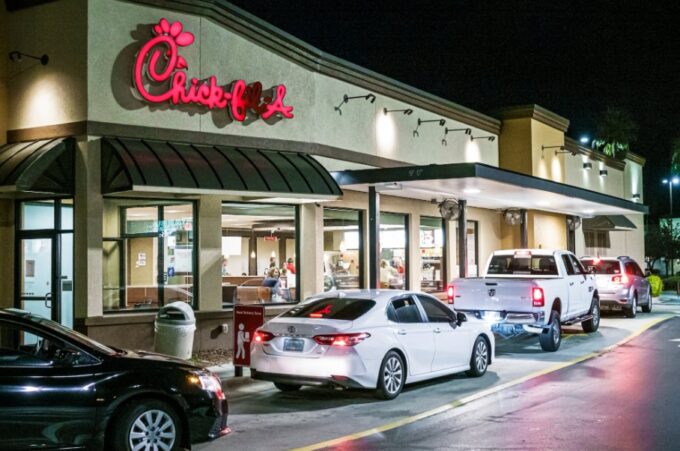
What are the costs associated with opening a Chick-fil-A franchise?
Opening a Chick-fil-A franchise requires a relatively low initial franchise fee of ,000. However, there are ongoing royalties based on a percentage of gross sales. Keep in mind that while the initial costs are relatively modest, Chick-fil-A covers the majority of startup costs including real estate and restaurant equipment which the operator then rents.
What is the approval process for a Chick-fil-A franchise?
The approval process for a Chick-fil-A franchise includes several stages that assess an applicant’s suitability. This involves an initial online form, an in-depth review of qualifications, interviews, assessments, and an understanding of mutual obligations. If an applicant successfully passes these stages, they will then proceed to a comprehensive training program before gaining final approval.
What qualifications are required to apply for a Chick-fil-A franchise?
Qualifications for a Chick-fil-A franchise include significant leadership or managerial experience, a commitment to being fully engaged in day-to-day operations, financial capacity, and a personal alignment with Chick-fil-A’s corporate culture, including a passion for customer service and community involvement.
What kind of training and support does Chick-fil-A provide franchisees?
Chick-fil-A offers a robust training program sprawling over several weeks that covers all elements from food preparation to business management, providing a solid foundation for their franchisees.
The company also supports its operators with ongoing development courses, mentorship from experienced franchisees, quality control procedures, and marketing strategies.
How does Chick-fil-A’s site selection process work?
Chick-fil-A’s site selection is controlled by the franchisor and not the franchisee. The company selects and retains ownership of the real estate, ensuring locations align with strategic expansion goals. Franchisees are charged a rental fee for the use of the property and equipment.
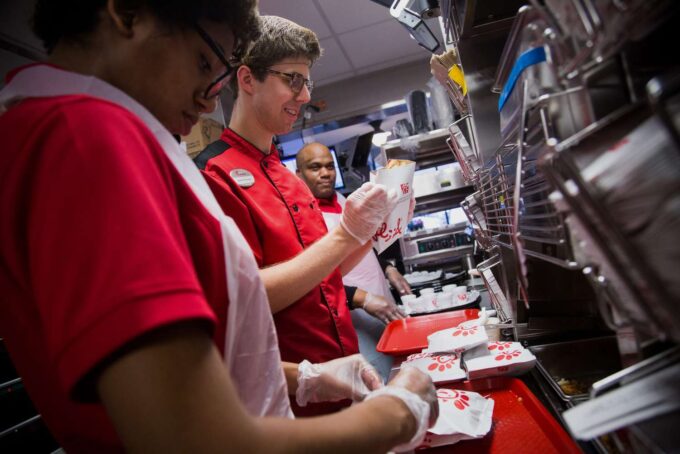
Can Chick-fil-A franchises be passed on or sold?
No, Chick-fil-A franchises cannot be passed on or sold. Chick-fil-A retains ownership of each restaurant property, and as a result, operators do not build equity in the business. This is distinct from the traditional franchise model.
Operators must actively work in the restaurant and are selected primarily for their ability to operate a business, not to own an asset.
Is a Chick-fil-A franchise a good investment?
A Chick-fil-A franchise can be a good investment for individuals who are enthusiastic about the hands-on operational model, align with the company’s values, and are committed to maintaining the brand’s standard of service and quality.
However, it may not be suitable for those seeking a passive investment or equity in real estate.
What are the ongoing fees after opening a Chick-fil-A franchise?
Chick-fil-A franchisees are required to pay ongoing royalties, which are a percentage of their gross sales.
This contributes to the franchise system and supports continuous provision of services from the franchisor, such as national advertising, research and development, and operational support.
How does Chick-fil-A ensure franchisee success?
Chick-fil-A ensures franchisee success by providing a rigorous training program, continual support, effective business strategies, operational guidance, and maintaining a strong brand presence.
Additionally, operators are expected to immerse themselves in the business, fostering an environment conducive to growth and strong performance.


